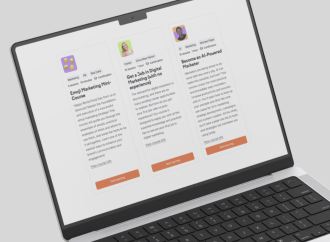When it comes to financing your business, there’s no one-size-fits-all solution. The right loan option depends on your specific needs, whether that’s expanding your operations, covering short-term cash flow gaps, purchasing equipment, or managing day-to-day expenses. With so many business financing options available in 2025, ranging from traditional loans to tech-driven solutions, it’s important to

When it comes to financing your business, there’s no one-size-fits-all solution. The right loan option depends on your specific needs, whether that’s expanding your operations, covering short-term cash flow gaps, purchasing equipment, or managing day-to-day expenses. With so many business financing options available in 2025, ranging from traditional loans to tech-driven solutions, it’s important to understand the differences. Factors such as how long your business has been operating, your credit score, the amount you need, and how fast you need the funds will all play a role in your decision. Below, we break down 10 common types of business loans to help you figure out which one fits your needs best.
- Term Loans
Term loans provide a lump sum of money upfront, which you repay over a set period with fixed monthly payments. They are ideal for established businesses with consistent revenue that need a large amount of capital for things like expansion, buying equipment, or acquiring another business. Typically, these loans require a solid credit history and at least six months to two years of business operation. - SBA Loans
SBA loans are offered by banks but come with a partial guarantee from the U.S. Small Business Administration, making them less risky for lenders. This leads to lower interest rates and longer repayment terms, sometimes up to 25 years. SBA loans are great for businesses that have strong credit and can handle the more involved application process. These loans can be used for working capital, real estate, equipment, and more, but they require a detailed business plan, financials, and sometimes collateral. - Business Lines of Credit
A business line of credit is a flexible form of financing that works like a credit card. You are approved for a credit limit and can borrow up to that limit as needed, only paying interest on the amount you draw. It’s perfect for businesses that experience fluctuating cash flow or need a financial cushion for short-term expenses. You don’t have to reapply for funds each time, which makes this a great option for covering daily operational costs. - Microloans
Microloans are small loans, typically ranging from a few hundred dollars to $50,000. They are often offered by nonprofit organizations or alternative lenders focused on supporting small businesses and community development. Microloans are a good option for startups or smaller businesses that need a boost for daily expenses or minor expansions but don’t need a large loan. - Equipment Loans
Equipment loans are designed for businesses that need to purchase or upgrade machinery, vehicles, or other major assets. The equipment itself serves as collateral for the loan, which can make it easier to qualify. This type of loan helps businesses preserve working capital for other expenses while investing in essential equipment. - Invoice Factoring
Invoice factoring allows businesses to sell their outstanding invoices to a factoring company at a discount. The factoring company then collects the payments from your clients, and you receive immediate cash. This option is ideal for businesses dealing with customers who have long payment terms and need quick access to cash for things like payroll or inventory restocking. - Invoice Financing
Similar to factoring, invoice financing allows you to borrow money against your unpaid invoices. Instead of selling the invoices, you use them as collateral to secure a cash advance. You maintain control over the collection process, and once your clients pay their invoices, you repay the loan, plus any fees or interest. This option works well for businesses that want quick capital but also want to maintain customer relationships. - Merchant Cash Advances (MCA)
With a merchant cash advance, you receive upfront capital in exchange for a percentage of your future credit card sales. Instead of fixed monthly payments, repayments are automatically deducted from your daily or weekly transactions. MCAs are a good option for businesses with strong credit card sales but little collateral or credit history, though they can be expensive compared to other financing options. - Personal Loans for Business
In some cases, entrepreneurs use personal loans to finance their business, especially if the business is new and doesn’t have a strong credit history. These loans are based on your personal credit score and can be approved more quickly than traditional business loans. While personal loans can provide much-needed capital for startups, they carry more personal risk, as defaults affect your own credit. - Business Credit Cards
Business credit cards offer a revolving credit line that you can use whenever necessary. They are great for covering day-to-day expenses or smaller recurring purchases like office supplies or software. Many business credit cards also offer rewards programs, helping you offset costs or earn travel points. They are especially useful if you can pay off the balance each month, avoiding interest charges and helping you build your business credit profile for future loans.
Choosing the Right Loan
Choosing the right business loan comes down to evaluating your business’s financial health, the timeline for when you need funds, and the purpose of the loan. For example, if you need a large sum with a low interest rate and can afford a lengthy application process, an SBA loan might be the best choice. If you need quick access to funds, options like merchant cash advances or invoice factoring could be better suited to your needs. Make sure to weigh the benefits of each loan—whether it’s flexible repayment, low interest rates, or quick funding—against any potential drawbacks like higher fees or collateral requirements.
It’s also important to shop around and compare different lenders, rates, and terms. Researching and understanding the pros and cons of each loan type will help you make the right decision for your business. Whether you’re looking for short-term or long-term financing, secured or unsecured loans, or specialized funding options like equipment financing, proper planning is essential to securing the right loan and positioning your business for success.

















Leave a Comment
Your email address will not be published. Required fields are marked with *